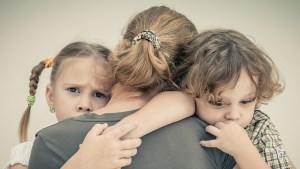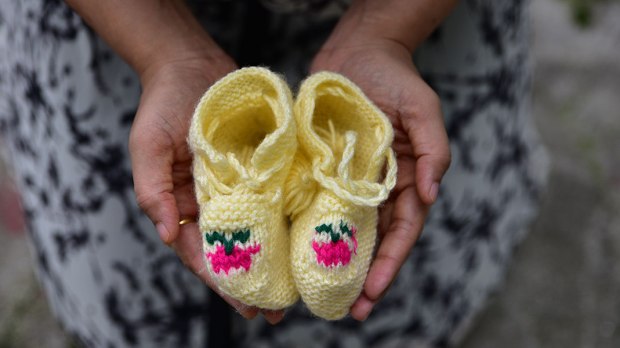“I did for Maëlis all that a mother can do for her child,” says Isabelle Verney. After having two boys, Mayeul and Maxence, Verney lost a little girl, Maëlis, a few days before her due date in October 2015, due to an umbilical cord issue.
In a recent book, “Ma main dans la tienne” (“My Hand in Yours,” published in French) Verney shares her journey—human, psychological and spiritual—of mourning this little girl who left too soon. At the end of her journey, three years later, she gave birth to another daughter, little Adelais.
Verney speaks openly about the daily repercussions of losing a baby and shares her deep questions about the salvation of her daughter’s soul, resulting in a deep message of hope. She discovered words and reflections that made it possible for her, not to forget, but to move forward. In close friends who went through the same ordeal, as well wise priests and her husband François, she found beacons that guided her through her painful process of mourning.
A different kind of motherhood, but motherhood nonetheless
What does motherhood consist of, if not loving and accompanying one’s child? This double mission fully applies to mothers who have miscarriages. One particularly comforting idea that Verney found is that this difficult and all-too-short motherhood allows women, in spite of all the suffering, to fulfill this double mission entrusted to each mother, starting with the conception of their tiny baby.
“These different experiences of motherhood are as complete as the others,” says Isabelle Verney. Even if it was short—too short—a mother cannot deny what she is for her child: a mother who accompanied her child to the end of his or her little life, a mother who lavished love on her child from the moment she learned of his or her existence. “For those of us who lose our children … it can be comforting to know that they were surrounded by love when it happened,” she says.
Verney shares the comforting words of one of her friends, Catherine, who said, “You have completely fulfilled your mission with her. It went too fast, of course, but you did everything a mother does for her baby. You accompanied her in everything. She’s in Heaven; that’s what every parent wants for their child. You’ve fulfilled your role for Maëlis.”
This is an important role that makes these mothers true mothers, despite the inconsolable absence of their children. It’s a transformative experience, as Blanche Streb writes: “Today, I’ve understood why there’s no special word to name a man or woman who loses a child. These words already exist, from all eternity: parents; daddy and mommy.”
The bond of motherhood remains forever, especially through the communion of saints, if one is a Christian. We see this truth in the Book of Isaiah when God, seeking to convince Israel of his love, takes maternal love as an example of unbreakable attachment: “Can a woman forget her nursing child, or show no compassion for the child of her womb?” (Is 49:15). “No, a woman does not forget,” replies Verney. “She learns to live with it.”

Read more:
How to help your children cope with your miscarriage

Read more:
How to cope with the fear of losing another baby after miscarriage

